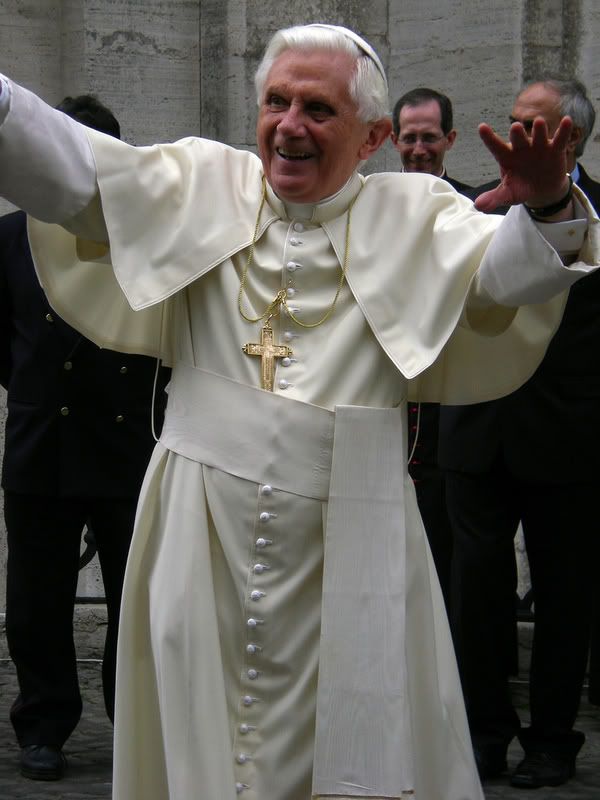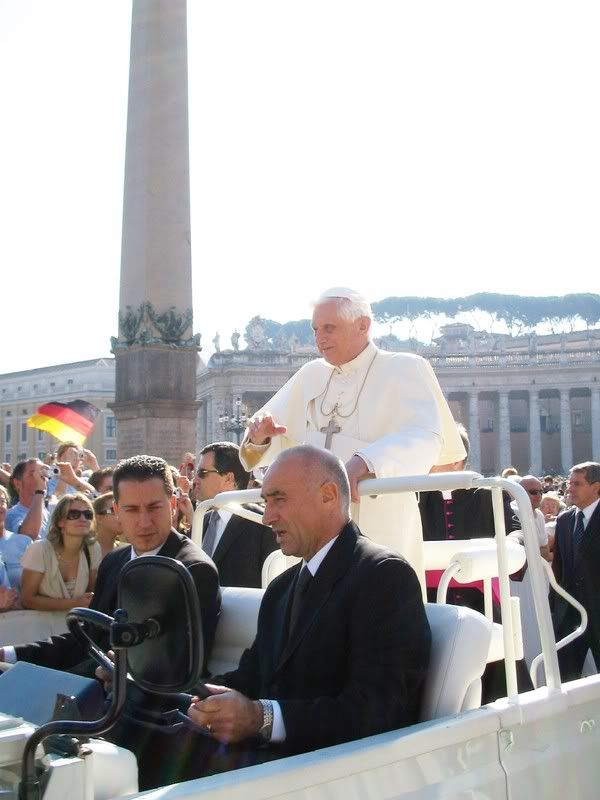
Now that I am not spending my spare time Calling For McCain I can get back to some of my regulars post. Such as the Louisiana Catholic Blog update and the ever popular (I think) Papal Wednesday Audience post!!! Thanks to the Ratzinger Froum for the text and pics
THE HOLY FATHER'S CATECHESIS #11 Catechetical Cycle for the Pauline Year
Dear brothers and sisters, "If Christ has not been raised, then empty (too) is our preaching; empty, too, your faith... (and) you are still in your sins." (1 Cor 15,14-17). With these powerful words in the first Letter to the Corinthians, St. Paul makes us understand the decisive importance that he attributed to the resurrection of Jesus. In fact, in that event is the solution to the problem posed by the tragedy of the Cross. By itself, the Cross cannot explain the Christian faith, but would simply remain a tragedy, an indication of the absurdity of being.
The Paschal mystery consists in the fact that the Crucified One "was raised on the third day in accordance with the scriptures" (1 Cor 15,4) - as early Christian tradition affirmed. This is the master key to Pauline Christology: everything turns around this center of gravity. The entire teaching of the Apostle Paul always starts from and arrives at the mystery of He whom the Father raised from the dead.
The Resurrection is a fundamental fact, almost like a previous axiom (cfr 1 Cor 15,12) ['But if Christ is preached as raised from the dead, how can some among you say there is no resurrection of the dead?'], on the basis of which Paul could formulate his announcement (kerygma) in brief: He who was crucified, who thus manifested the immense love of God for man, is resurrected and lives in our midst. It is important to grasp the connection between the announcement of the Resurrection as Paul formulated it, and that which was in use by the first pre-Pauline Christian communities. Here we can really see the importance of the tradition that preceded the Apostle and that he, with great respect and attention, wished in his turn to transmit. The text on the Resurrection, contained in Chapter 1, verses 1-11, of the first letter to the Corinthians, highlights very well the nexus between 'receiving' and 'transmitting'.
St. Paul places great importance on the literal formulation of tradition. At the end of the passage mentioned, he underscores: "Whether it be I or they, so we preach and so you believed" (1 Cor 15,11), thus bringing to light the unity of the kerygma, the announcement for all believers and for all those who will announce the resurrection of Christ. The tradition he refers to is the source he draws from. The originality of his Christology is never at the expense of faithfulness to tradition. The kerygma of the Apostles always precedes Paul's personal re-elaboration. Every argument of his proceeds from the common tradition which expresses the faith shared in all the churches who are but one Church.
Thus, Paul offers a model for all time on how to make theology and how to preach. The theologian, the preacher, does not create new visions of the world and of life, but is at the service of the real facts of Christ, the Cross, the resurrection. His task is to help us understand today, behind the ancient words, the reality of 'God-with-us', and therefore, the reality of true life. It is a good opportunity to clarify here that St. Paul, in announcing the resurrection, is not concerned with presenting an organic doctrinal exposition of it - he did not intend to write a manual of theology - but confronts the subject by responding to the concrete doubts and questions that the faithful brought him, through discourses dictated by circumstances but full of lived faith and theology.
We find in them a focus on the essential fact that we are 'justified', that is, we are 'made just' and saved, by Christ who died and resurrected for us. What emerges above all is the fact of the Resurrection, without which Christian life would simply be absurd. On that Easter morning, something extraordinary happened, something new, which was at the same time, very concrete, marked by very precise signs, and reported by many witnesses. Even for Paul, as for the other authors of the New Testament, the resurrection is linked to the testimony of those who had a direct experience of the resurrected Christ. It meant seeing and feeling not only with the eyes and other senses, but also with an interior light which urges acknowledgment of that which the external senses attest to be objective fact.
Thus Paul, like the four Gospels, gives a fundamental importance to the apparitions [of the risen Christ] which are a basic condition for faith in the Resurrected One who had left his tomb empty. These two facts are important: the tomb was empty, and Jesus really appeared [to his disciples] afterwards. That is the chain of tradition which, through the testimony of the Apostles and the first disciples, has reached down to successive generations and to us. The first consequence, or the first way to express this testimony, was to preach the resurrection of Christ as a synthesis of the Gospel announcement and as the culmination of a salvific itinerary. Paul does all this on different occasions: if we consult the Letters and the Acts of the Apostles, we can see that the essential point for him always was to bear witness to the resurrection.

I wish to cite just one text. Paul, arrested in Jerusalem, stands before the Sanhedrin as an accused person. On this occasion when life and death were at stake for him, he indicates the sense and the content of all his preaching: "(I) am on trial for having hope in the resurrection of the dead" (Acts 23,6). Paul will repeat this refrain in his Letters (cfr 1 Ts 1,9sl 4,13-18; 5,10), in which he refers to his own personal experience, his personal encounter with the Risen Christ (cfr Gal 1,15-16; 1Cor 9,1).
But we may ask: What was the profound sense of the Resurrection event for Paul? What does he tell us at a distance of 2000 years? Is the affirmation :Christ is risen" actual even for us? Why is the resurrection, for him and for us, a topic that should be so determinative? Paul solemnly gives an answer to this question at the start of the Letter to the Romans, where he begins by referring to "the gospel of God... the gospel about his Son, descended from David according to the flesh, but established as Son of God in power according to the spirit of holiness through resurrection from the dead" (Rm 1,3-4). Paul knows well and says so many times that Jesus was always the Son of God, from the moment of his incarnation. The novelty of the Resurrection is in the fact that Jesus, elevated from the humility of his earthly existence, becomes established as the Son of God 'in power'.
The Jesus who was humiliated to the point of death on the Cross can therefore say to the Eleven: "All power in heaven and on earth has been given to me" (Mt 28,18). Psalm 2,8 has been realized: "Only ask it of me, and I will make your inheritance the nations, your possession the ends of the earth" (Ps 2,8). That is why the announcement of the Gospel of Christ to all the peoples starts with the Resurrection. With it begins the Kingdom of Christ, the new Kingdom which knows no other power but that of truth and love.
Thus the Resurrection definitively reveals the authentic identity and the extraordinary stature of the Crucified One - an incomparable and supreme dignity: Jesus is God. For St. Paul, the secret identity of Jesus, more than in the Incarnation, is revealed in the mystery of the resurrection. While the title of Christ, which means Messiah, 'the anointed one', tends to be, in Paul, the proper name of Jesus, and the title of 'Lord' specifies his personal relationship with believers, now the title 'Son of God' illustrates the intimate relationship of Jesus to God, a relationship which is fully revealed in the Paschal mystery. Thus, it can be said that Jesus was resurrected to be the Lord of the living and the dead (cfr Rm 14,9; 2 Cor 5,15), or in other words, our Savior (cfr Rm 4,25).
All this is pregnant with important consequences for our life of faith: we are called to take part to the very depth of our being in the whole experience of the death and resurrection of Christ. The Apostle says: "We have died with Christ" and "We believe that we shall also live with him, (knowing) that Christ, raised from the dead, dies no more; death no longer has power over him" (Rm 6,8-9).
This translates to a sharing in the suffering of Christ, which precedes that full configuration with him, through the resurrection which we look forward to with hope. This is what happened even with St. Paul, whose personal experience is described in his Letters with such heartfelt but equally realistic tones: "To know him and the power of his resurrection and (the) sharing of his sufferings by being conformed to his death, if somehow I may attain the resurrection from the dead" (Phil 3,10-11; cfr 2 Tm 2,8-12). The theology of the Cross is not a theory - it is the reality of Christian life. To live in our faith in Jesus Christ, to live truth and love, implies renouncing daily, it implies suffering. Christianity is not a way of convenience, but a demanding ascent, though one illuminated by the light of Christ and the great hope that is born with him.
St. Augustine says that Christians are not spared from suffering - indeed, a little more of it falls to them, because to live the faith is to express courage in facing life and history more deeply. Nonetheless, it is only in this way, in experiencing what it is to suffer, that we can know life in its depth, in its beauty, and in the great hope inspired by Christ crucified and resurrected. Thus, the believer find himself between two poles. On the one hand, the resurrection which in some way is already present and working in us (cfr Col 3,1-4; Eph 2,6); on the other, the urgency of inserting ourselves into that process that leads everything and everyone towards fullness, described in the Letter to the Romans with a daring image: as all creation moans and suffers something like the pain of childbirth, so do we moan in expectation of the redemption of our bodies, of our own redemption and resurrection (cfr Rm 8,18-23).
In summary, we can say with Paul, that the true believer obtains salvation, professing with his own mouth that Jesus is the Lord, and believing in his heart that God has resurrected him from the dead (cfr Rm 10,9). What is important, first of all, is the heart that believes in Christ and which, in the faith, 'touches' the Resurrected Lord. But it is not enough to carry faith in one's heart - we should confess it and testify to it with our mouth, with our life, thus rendering present the truth of the cross and the resurrection in our history.
This is the way, in fact, whereby the Christian places himself within that process thanks to which the first Adam, earthly and subject to corruption and death, becomes transformed into a new Adam, who is heavenly and incorruptible (cfr 1 Cor 15, 20-22,42-49). This process began with the resurrection of Christ, on which we base the hope of being able ourselves one day to enter with Christ into our true homeland in heaven. Sustained by this hope, let us proceed with courage and with joy.
















No comments:
Post a Comment